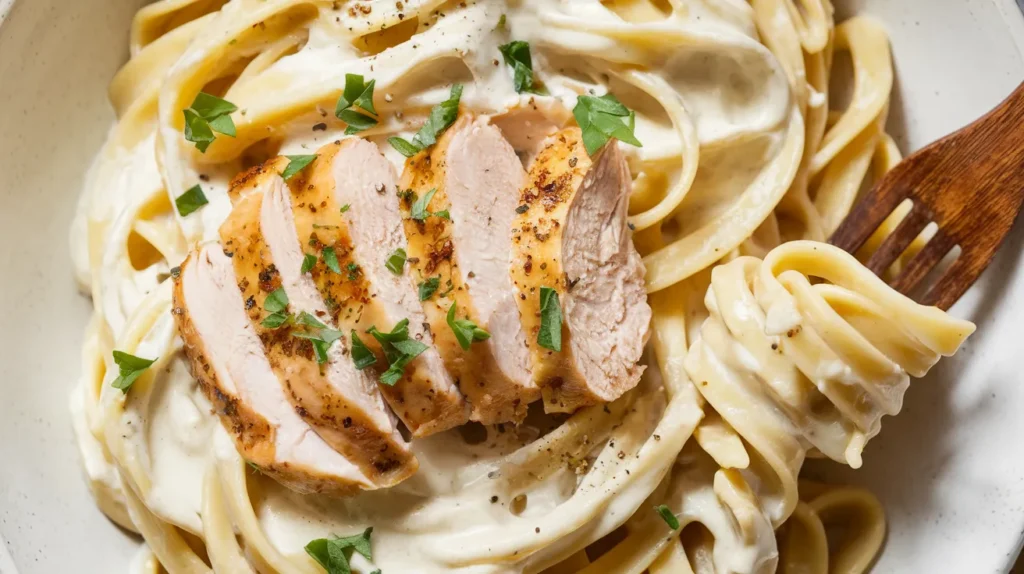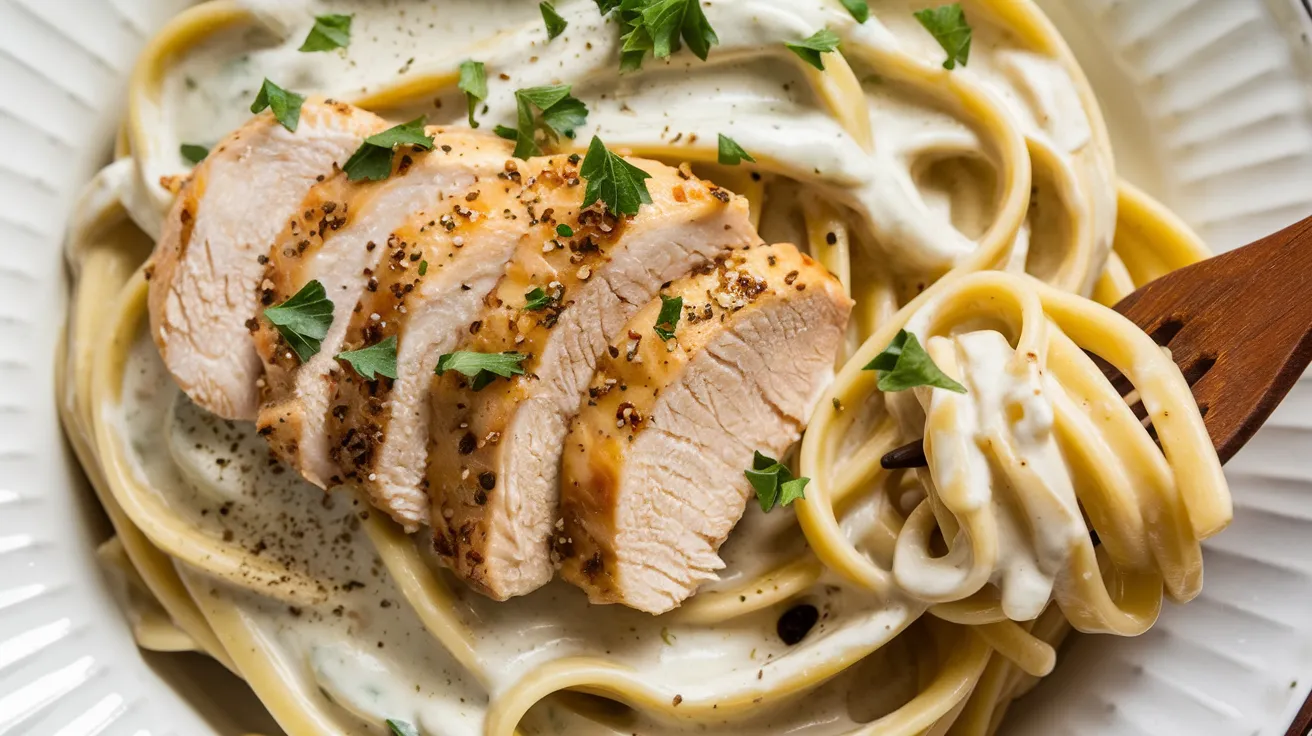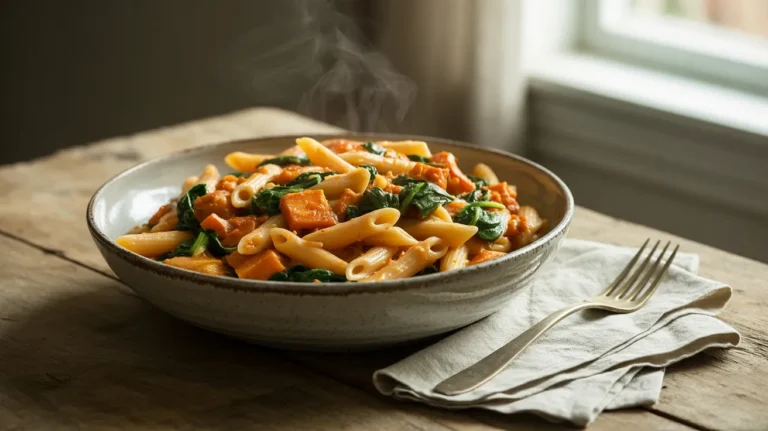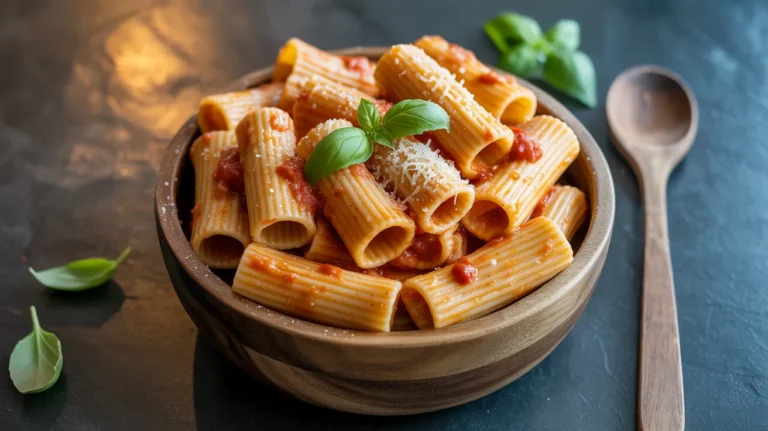Key Takeaways:
- Learn how to create restaurant-quality Chicken Fettuccine Alfredo without breaking your budget
- Master the exact timing to achieve perfectly cooked pasta and juicy chicken
- Discover the crucial technique that prevents your Alfredo sauce from separating
- Find out which cheese blend creates the creamiest, richest flavor profile
Why This Chicken Fettuccine Alfredo Recipe Stands Out
Ever tried making Chicken Fettuccine Alfredo at home only to end up with a sauce that’s too thin, pasta that’s overcooked, or chicken that’s dry and tough? You’re not alone.
This Chicken Fettuccine Alfredo recipe solves those common problems with straightforward techniques and simple ingredients. In just 35 minutes, you’ll have a restaurant-worthy dish that serves four people perfectly. If you enjoy creamy pasta dishes, you might also love my cheesy chicken pasta for another comforting weeknight option.
Nutrition Information
| Nutrient | Amount per Serving |
|---|---|
| Calories | 720 |
| Protein | 42g |
| Carbohydrates | 52g |
| Fat | 38g |
| Sodium | 850mg |
| Fiber | 3g |
| Sugar | 4g |
What You’ll Need for Chicken Fettuccine Alfredo
Ingredients
| Ingredient | Quantity | Notes |
|---|---|---|
| Fettuccine pasta | 12 oz (340g) | Regular or fresh |
| Boneless, skinless chicken breasts | 1.5 lbs (680g) | About 2 large breasts |
| Unsalted butter | 4 tablespoons (60g) | Divided |
| Garlic | 4 cloves | Minced |
| Heavy cream | 2 cups (480ml) | Room temperature |
| Parmesan cheese | 1.5 cups (150g) | Freshly grated |
| Salt | 2 teaspoons | Divided |
| Black pepper | 1 teaspoon | Freshly ground |
| Olive oil | 2 tablespoons | For cooking chicken |
| Fresh parsley | 2 tablespoons | Chopped, for garnish |
| Italian seasoning | 1 teaspoon | Optional |
| Nutmeg | 1/8 teaspoon | Just a pinch |
Kitchen Tools
| Tool | Purpose |
|---|---|
| Large pot | For boiling pasta |
| Colander | For draining pasta |
| Large skillet or sauté pan | For cooking chicken and sauce (12-inch size works best) |
| Cutting board | For preparing ingredients |
| Sharp knife | For cutting chicken |
| Measuring cups and spoons | For accurate measurements |
| Wooden spoon or silicone spatula | For stirring sauce |
| Cheese grater | For fresh Parmesan |
| Meat thermometer | For checking chicken doneness |
| Tongs | For tossing pasta |
| Timer | To track cooking times |
| Aluminum foil | For covering chicken while it rests |
Possible Substitutions
- Heavy cream: Half-and-half or whole milk (sauce will be less rich)
- Parmesan cheese: Pecorino Romano or Grana Padano
- Fettuccine: Linguine, tagliatelle, or pappardelle
- Chicken breasts: Boneless chicken thighs (for juicier meat)
- Fresh garlic: 1 teaspoon garlic powder (but fresh is better)
Step-by-Step Chicken Fettuccine Alfredo Instructions
Prep Time: 10 minutes Cook Time: 25 minutes Total Time: 35 minutes Servings: 4
Preparation Phase
- Set up your workspace
- Clear your countertop to create a comfortable working area
- Place your cutting board in a stable position
- Arrange all ingredients on the counter so they’re easy to reach
- Read through the entire recipe at least once before starting
- Bring water to boil
- Take out a large pot (at least 6-quart capacity)
- Fill it with 4 quarts (3.8 liters) of cold water (about 3/4 full)
- Add 1 tablespoon of salt to the water (this will flavor the pasta)
- Place the pot on your largest burner and turn the heat to high
- Cover with a lid to help it boil faster
- It will take about 8-10 minutes to reach a rolling boil (large bubbles that don’t stop when stirred)
- Prepare the chicken
- Take the chicken breasts out of packaging and place on the cutting board
- Pat them completely dry with paper towels (this is important for browning!)
- Place your hand flat on top of one chicken breast
- Using a sharp knife, carefully cut horizontally through the middle if the breast is very thick (this creates even thickness)
- Cut each chicken breast into strips about 1-inch wide (about the width of your thumb)
- Place chicken strips in a bowl
- Sprinkle with 1 teaspoon salt and 1/2 teaspoon pepper, using your hands to coat all pieces evenly
- Wash your hands thoroughly with soap after handling raw chicken
- Prepare other ingredients
- Peel 4 garlic cloves by placing them under the flat side of your knife and pressing gently with your palm
- Mince the garlic by cutting it into very small pieces (about the size of grains of rice)
- Take out the Parmesan cheese and grate it if not already grated (measure 1.5 cups after grating)
- Chop fresh parsley leaves finely using a rocking motion with your knife
- Set out butter to soften slightly
- Take heavy cream out of refrigerator to warm up a bit (about 15 minutes before using)
- Measure all other ingredients and place in small bowls for easy access
Cooking Phase
- Cook the chicken
- Take out your large skillet or sauté pan (12-inch is ideal)
- Place it on medium-high heat
- Add 2 tablespoons olive oil to the pan
- Let the oil heat for about 1 minute until it’s shimmering but not smoking (you’ll see ripples in the oil)
- Using tongs, carefully place chicken strips in the pan without overcrowding (work in batches if needed)
- Let chicken cook undisturbed for 3-4 minutes (resist the urge to move it!)
- Check the bottom of one piece – it should be golden brown
- Using tongs, flip each piece of chicken to cook the other side
- Cook for another 3-4 minutes
- Check doneness with a meat thermometer inserted into the thickest part – it should read 165°F (74°C)
- If not quite done, continue cooking for 1-2 minutes more
- Once done, transfer chicken to a clean plate
- Cover loosely with aluminum foil to keep warm
- Beginner tip: If your chicken is browning too quickly, lower the heat
- Cook the pasta
- Your water should be boiling by now (large, vigorous bubbles)
- Add the fettuccine pasta to the water
- Important technique: Hold the pasta bundle and fan it out as you lower it into the water
- Once pasta is in, stir gently with a wooden spoon to prevent sticking
- Set your timer for the cooking time on the package (usually 8-10 minutes for dried, 2-3 minutes for fresh)
- Stir occasionally during cooking
- About 2 minutes before pasta is done, scoop out 1 cup of the starchy pasta water using a measuring cup and set aside
- To test for doneness, carefully remove one strand of pasta, run it under cold water, and taste it – it should be “al dente” (tender but still slightly firm in the center)
- Place your colander in the sink
- Carefully pour pasta and water into the colander to drain (watch out for steam!)
- Do not rinse the pasta – the starch helps the sauce stick
- Start the Alfredo sauce
- Return to the same skillet you used for chicken (no need to clean it – those browned bits add flavor!)
- Reduce heat to medium
- Add 2 tablespoons butter to the pan
- Wait until butter is completely melted and starts to bubble slightly
- Add the minced garlic
- Stir constantly for exactly 30 seconds (use your timer!)
- Beginner warning: Garlic burns easily and becomes bitter – keep it moving in the pan
- The garlic should become fragrant but not brown
- Create the cream base
- Keep heat at medium
- Slowly pour in the 2 cups heavy cream while stirring
- Add remaining 1 teaspoon salt and 1/2 teaspoon pepper
- Add the pinch of nutmeg (1/8 teaspoon or less)
- Stir everything together well
- Wait for the cream to start bubbling gently around the edges (small bubbles will form)
- This is called a “simmer” – adjust heat to maintain this gentle bubbling
- Reduce heat to medium-low if bubbling is too vigorous
- Let simmer for 3-5 minutes, stirring occasionally with wooden spoon
- The sauce will thicken slightly – you’ll notice it coat the back of a spoon
- Beginner tip: If sauce ever starts boiling rapidly (large bubbles), immediately reduce heat
- Add the cheese
- Critical step for beginners: Remove pan completely from heat
- Let the cream mixture cool for about 30 seconds (this prevents the cheese from clumping)
- Add Parmesan cheese in 6 small batches (about 1/4 cup at a time)
- Whisk continuously between each addition
- Wait until each batch is fully melted before adding the next
- After all cheese is incorporated, check sauce consistency
- It should be smooth and coat the back of a spoon
- If sauce is too thick, add reserved pasta water, 1 tablespoon at a time, stirring after each addition
- If sauce seems too thin, don’t worry – it will thicken more as it cools slightly
- Beginner warning: Never boil the sauce after adding cheese or it will separate
- Combine everything
- Return pan to low heat
- Add remaining 2 tablespoons butter to sauce and stir until completely melted
- Cut chicken strips into bite-sized pieces if desired
- Return chicken to the skillet, including any juices that have collected on the plate
- Gently stir to coat chicken with sauce
- Add the drained fettuccine to the sauce
- Using tongs, gently lift and turn pasta to coat with sauce (tongs work better than a spoon for this)
- If needed, add more reserved pasta water, 1 tablespoon at a time, until sauce reaches desired consistency
- Continue tossing gently for about 1-2 minutes until everything is well combined and heated through
- Beginner tip: If your pan isn’t big enough, you can return pasta to the large pot and add sauce to it instead
Finishing Touches
- Final seasoning check
- Taste a small amount of pasta and sauce
- Add more salt or pepper if needed
- If sauce tastes flat, add a tiny bit more salt (1/4 teaspoon)
- If you want more garlic flavor, you can add a sprinkle of garlic powder now
- Serve immediately
- Warm 4 plates or pasta bowls by running them under hot water and drying them
- Use tongs to portion pasta and chicken onto each plate, twisting as you place to create a nice height
- Spoon any remaining sauce from the pan over each serving
- Sprinkle each portion with additional freshly grated Parmesan cheese
- Garnish with chopped fresh parsley
- Add a final crack of fresh black pepper on top
- Serve with garlic bread if desired

Troubleshooting Your Chicken Fettuccine Alfredo
Common Problems and Solutions
Sauce is too thin:
- Continue simmering for a few more minutes
- Mix 1 teaspoon cornstarch with 1 tablespoon cold water and add to sauce
- Remember that sauce will thicken as it cools slightly
Sauce is too thick:
- Add reserved pasta water, 1 tablespoon at a time, until desired consistency
- If you’ve run out of pasta water, warm milk can be used instead
Sauce is grainy or separated:
- This usually happens if heat is too high or cheese is added too quickly
- Remove from heat completely
- Add a splash of cream (about 2 tablespoons)
- Whisk vigorously until smooth
- Next time, make sure to remove pan from heat before adding cheese
Chicken is dry:
- Cut a piece open – if it looks white and fibrous, it’s overcooked
- Add a bit more sauce to help moisten it
- For next time, slightly undercook chicken initially (to about 160°F), as it will continue cooking when returned to sauce
- Consider using chicken thighs instead of breasts next time
Pasta is clumping:
- This happens if pasta sits too long after draining
- Next time, time the pasta to finish cooking just as the sauce is ready
- If it’s already clumping, add a splash of olive oil and gently separate with tongs
Garlic burned and tastes bitter:
- If you catch it early, remove the garlic and start fresh
- If it’s already mixed into the sauce, you may need to start the sauce over
- Next time, use lower heat and keep stirring constantly
Variations & Substitutions for Chicken Fettuccine Alfredo
Veggie Addition
Add 2 cups of broccoli florets, 1 cup of peas, or 3 cups of fresh spinach during the last few minutes of cooking the pasta for added nutrition. For a lighter version that still features chicken and pasta, you might enjoy my Chicken Caesar Pasta Salad recipe as well.
Seafood Switch
Replace chicken with 1 pound of peeled, deveined shrimp for a seafood Alfredo. Cook shrimp for just 2 minutes per side until pink.
Lightened-Up Version
Use half-and-half instead of heavy cream and reduce butter to 2 tablespoons total for a lighter option (saves approximately 150 calories per serving).
Garlic Lovers
Double the garlic and add 1/2 teaspoon garlic powder for an extra garlic punch. Add 1 tablespoon roasted garlic for depth.
Cheese Variation
For a more complex flavor profile in your Chicken Fettuccine Alfredo, try incorporating different cheeses. My Chicken Pasta Gorgonzola uses a different cheese that creates a uniquely rich flavor you might want to experiment with in this recipe as well.
Storage & Reheating
Refrigerator Storage
- Allow leftovers to cool for no more than 30 minutes
- Transfer to airtight containers (glass works best)
- Store in refrigerator for up to 3 days
- The sauce will thicken considerably when cold – this is normal
Freezer Storage
- Not recommended for freezing as cream-based sauces tend to separate when thawed
- If you must freeze, expect texture changes upon reheating
Reheating Instructions
- Stovetop method (best option):
- Place leftovers in a skillet over medium-low heat
- Add 1-2 tablespoons of milk or cream per serving
- Cover with a lid
- Heat gently, stirring every minute
- Continue until internal temperature reaches 165°F (about 5-7 minutes)
- If sauce separates, remove from heat and whisk vigorously
- Microwave method (quick option):
- Place single serving in a microwave-safe container
- Add 1 tablespoon of milk or cream per cup of pasta
- Cover with a damp paper towel
- Heat at 50% power for 1 minute
- Stir thoroughly
- Continue heating in 30-second intervals at 50% power, stirring between each
- Be careful not to overheat, which causes sauce to separate
- Let stand for 1 minute before eating
Safety Notes & Tips
Food Safety
- Always wash hands for 20 seconds with soap before and after handling raw chicken
- Use separate cutting boards for meat and vegetables
- Sanitize all surfaces that come into contact with raw chicken
- Chicken must reach an internal temperature of 165°F (74°C) to be safe
- Don’t leave cream-based sauce at room temperature for more than 2 hours (1 hour if room is above 90°F)
- Refrigerate leftovers promptly
Tips for Success with Chicken Fettuccine Alfredo
- Mise en place: Prepare and measure all ingredients before starting to cook
- Warm your cream: Let heavy cream sit at room temperature for 15-20 minutes before using to prevent it from “shocking” when added to hot pan
- Quality matters: Use genuine Parmigiano-Reggiano cheese for the best flavor (look for the words stamped on the rind)
- Pasta water is liquid gold: Always save some pasta water – the starch in it helps sauce cling to pasta
- Pasta timing: Start cooking pasta when you begin making the sauce so everything finishes at the same time
- Season in layers: Add salt to pasta water, chicken, and sauce separately for balanced flavor
- Low and slow: Keep heat moderate to prevent sauce from separating
- Rest your chicken: Let it rest 5 minutes before slicing to keep juices inside
- Twirl and serve: Use tongs to twirl pasta into a spiral shape on plates for an attractive presentation




